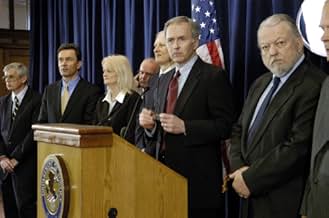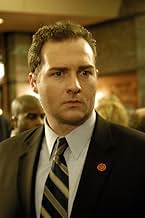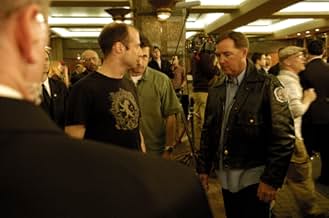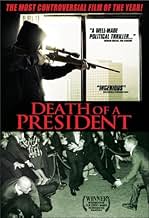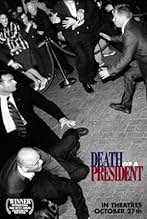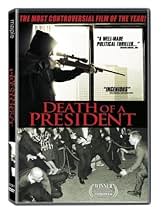Des années après l'assassinat du président George W. Bush à Chicago, un documentaire d'investigation se penche sur ce crime non encore élucidé.Des années après l'assassinat du président George W. Bush à Chicago, un documentaire d'investigation se penche sur ce crime non encore élucidé.Des années après l'assassinat du président George W. Bush à Chicago, un documentaire d'investigation se penche sur ce crime non encore élucidé.
- Réalisation
- Scénario
- Casting principal
- Nomination aux 1 BAFTA Award
- 6 victoires et 1 nomination au total
- Self
- (images d'archives)
- (non crédité)
- Samir Masri
- (as Seena Jon)
- Casey Claybon
- (as M. Neko Parham)
Avis à la une
I'm happy to report: I was wrong. "Death of a President" is a very well written, performed and directed drama in the style of a modern (and hardly opinionated) documentary. And most surprisingly, it isn't really a movie about George W Bush.
It was a very smart move to make it a "mock" documentary, since it keeps the viewer on a skeptical distance to all the protagonists, so the movie doesn't push the audience into immediately placing the characters into the "good" and "bad" categories like it would be the case with a drama done in a conventional narrative. That gives room to examine the characters different motives and actions without having to rely on pressing the emotion-buttons too much. Of course this approach relies on convincing performances from all actors involved (mabybe even more so than with a conventional drama) to keep the illusion alive of actually watching a documentary.... over-acting could have been a disaster for this movie, and i'm very glad cast and director avoided that pitfall. Fine performances all around.
Now, to the obvious elephant in the room (and the reason why this movie is so controversial): Why did the makers of the movie not just have a fictional president killed? Shock value? Some kind of perverse joy in getting rid of the real President? I don't think so.
First of all, having the real President Bush in the movie obviously makes this theoretical exercise just more authentic and convincing. And more importantly, the viewer is forced to place himself somewhere among the characters, to place his sympathy and antipathy bets just based on preconceived notions, so to speak. I doubt there are many people who don't have a clear opinion about George W Bush and his administration (I certainly have mine. And in the interest of full disclosure, I'm no fan, to say the least). But that opinion (whatever it is) is important for the movie to get it's point across: it's the setup to play effectively with the viewers prejudices.
"Death of a President" manages to make you look beyond the stereotypes and makes a solid point about the misleading force of preconceived notions (for the viewer as well as the characters in the movie). The tag line "Do not rush to judge" is well chosen. The movie in particular makes a valid point about the worrying tendency in the US (and the world in general, I cant think of any society that's not to some degree affected by this "disease") of more and more dumbing everything down to "us versus them".
Be it the inflation of the word "Terrorist" as a magic opinion maker, (and drifting away from the movie for a second) be it Republicans versus Democrats, be it the insane shouting matches that pass as talk shows these days or be it the bizarre notion of an inevitable "clash of the civilizations".
The movie isn't perfect though. For example, the character of Bushs speech writer was a bit over the top in her praise for the man, while the protesting crowds remained rather stereotypical. Also, some doctored shots didn't quite live up to the otherwise impressive technical level of this production.
Yet "Death of a Presindent" offers a bit of much needed perspective on the Terrorism-issue; it sure does it by rather drastic means but it doesn't fail to deliver. Of course for me, as a distant observer of the USA, the fact that the actual President gets "assasinated" in this movie doesn't have quite the emotional punch as it must have for Americans. So I can understand the very mixed reactions it gets from reviewers.
But if you feel up to it, go see it yourself and then make up your mind, instead of rushing to judgment based on title and plot outline.
This docudrama opens with preparation for a presidential visit and speech at a Chicago hotel. You get a glimpse of the president's speech writer and an individual heading the Secret Service as they position themselves and prepare to protect the Commander in Chief. You get brief looks at large groups of protesters waiting in the streets to welcome the President.
And just like the title says - the President dies. All that happens in the first 20-minutes. The remaining 70-minutes of this film carefully details the hunt and investigation to find the killer. The impact on two minority families who may or may not be associated with the event. You see how an ethnic group becomes suspect and how hundreds are picked up for questioning. You get a peek at how the world receives the event and how the current phrases "terror attack" and "Al-Quida" are tossed into the mix.
The film is frightening because each and every scene is plausible. It's tightly written, directed and edited. The actors, who range from a close assistant to the President and First Lady to a spouse who may never see their innocent partner again, are all excellently cast.
Contrary to popular belief, Death of a President does not advocate the killing of a leader; instead it takes a credible look at America and the possible events following such an occurrence.
Trust me - this one you don't want to miss.
The point of the film is NOT some perverse fantasy about killing the current President of the United States of America, George Walker Bush Jr. People who say otherwise either haven't seen it or are wanting to purposely misguide you.
It is a drama in the style of a documentary (one that would air on television rather then a cinema screen) that looks at a possible run up to an assassination of the president, as well as how the investigation might be handled afterwards with the involvement of Dick Cheney (who would take over the Presidency if George Bush was assassinated).
The drama does not dwell or linger on the death of the president at all, in fact apart from Bush being crammed into his presidential car by secret service and whizzed away at high speed, that is all the viewer sees. You then find out about his death from mock news reports. Hardly a sordid gratification from a 'perverse' director.
The drama is convincing as a documentary by realistic interviews with decent unknown actors playing their roles just right without hyperbole as could quite easily be the case.
Without spoiling exact plot points, the drama makes a point in how the government may be more interested in finding a suspect and making the evidence fit the profile because it is more politically advantageous then actually running an investigation to find out exactly what happened, and draw suspects that way. Considering the current climate where seemingly the Geneva Convention is open to interpretation, and restrictions on Habeus Corpus, this suggestion is not far fetched in the slightest.
It aired on 'More 4' in the UK, a channel from Channel 4 television, and I'd imagine it would air on an American network at some point, or maybe a limited screening at cinemas if the US networks lose their bottle.
So for my US brothers and sisters, consider what I've written, and go SEE it and decide for yourself. That's what the freedom as a US Citizen entitles you to do.
I am impressed by the film's presentation of events. It cleverly mixes fictional footage with news footage, mixing interview with "facts" and the re-enactment of events are so real that it seems like a real documentary. The film allows the different sides to speak, which makes it more all rounded. Not only government officials, but the suspected assassin's wife get to be "interviewed" as well touches me. Many a times, these voices are silenced or suppressed. In this way, the various views and feelings get balanced.
It also approaches what truth really is. Is truth really the truth? Is it what people want to believe? Or is it what the authorities want you to believe? The twist ending reminds me of another powerful film, "The Life of David Gale".
This film is very powerful. It is deep and thought provoking. i truly recommend it.
The controversy, of course, stems from the use of the current U.S. President as the victim of an assassination. The assassination scene itself flies by and can't be more than 2-3 seconds long, so fast, in fact, you can be forgiven if you miss it altogether. It's what precedes and follows that scene that is the meat of the movie. Film footage of Bush and other real political figures is spliced seamlessly into this film, and includes footage of Vice-President Cheney and Mayor Daley of Chicago. None of these real persons are in any way abused or mis-characterized in the film. And the portrayal of fictional FBI agents, Chicago Police officers, and White House and Secret Service officials is, if anything, mostly very complimentary to them. This film does not do a hatchet job on anyone
What the use of real characters in a fictitious scenario allows the film-makers to do is to let the movie-goer realize that real actions have real consequences. And by putting real persons into a totally fictitious plot the film-makers can develop an accurate scenario - something that still can't be done with the Kennedy assassination of more that 40 years ago. We can't present an accurate portrayal of that real event even now because of the doubts cast on the whole event by the actions of our own government. The USG botched the assassination investigation so badly with its lies of omission and commission, that we will probably never know that whole truth about what happened that day in 1963. With the fictional scenario of Death of a President, though, we know exactly how things play out.
Whether you are a President, an assassin, an FBI agent, or just a movie-goer, realizing that actions have consequences - often unforeseen consequences, of course - is something we all need to be reminded of from time to time.
Le saviez-vous
- AnecdotesThe majority of the actors in the film were not told the premise of the movie. The working title for the film was "D.O.A.P.," and the actors were not told what the plot was, except for their specific scenes.
- GaffesWhen Eleanor Drake addresses the North Korean conflicts she calls the dictator "Kim Il-jung" instead of "Kim Jong-il", mixing his name with his father's (Kim Il-sung) together.
- Citations
[end title cards]
Title card: One year after his conviction, Jamal Abu Zikri has still not been granted leave to appeal.
Title card: He remains on death row in Stateville Correctional Center.
Title card: Since recording the interview for this film Robert H Maguire has resigned as Head of the Chicago Field Office of the FBI.
Title card: USA PATRIOT III, introduced in the days after the assassination, has since been turned into permanent law.
Title card: It has granted investigators unprecedented powers of detention and surveillance, and further expanded the powers of the executive branch.
Meilleurs choix
- How long is Death of a President?Alimenté par Alexa
Détails
- Date de sortie
- Pays d’origine
- Langues
- Aussi connu sous le nom de
- Death of a President
- Lieux de tournage
- Sociétés de production
- Voir plus de crédits d'entreprise sur IMDbPro
Box-office
- Budget
- 2 000 000 $US (estimé)
- Montant brut aux États-Unis et au Canada
- 519 086 $US
- Week-end de sortie aux États-Unis et au Canada
- 281 778 $US
- 29 oct. 2006
- Montant brut mondial
- 869 352 $US
- Durée1 heure 37 minutes
- Couleur
- Mixage
- Rapport de forme
- 1.85 : 1
Contribuer à cette page




